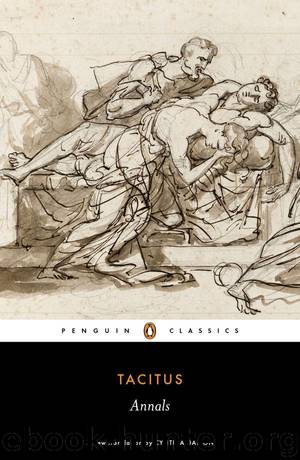Annals (Penguin Classics) by Tacitus

Author:Tacitus
Language: eng
Format: azw3
ISBN: 9780141392561
Publisher: Penguin Books Ltd
Published: 2012-11-28T16:00:00+00:00
Book 12
1. (48 CE, continued) Messalina’s killing produced dislocation in the Emperor’s household. A contest arose among the freedmen over who would choose a wife for Claudius, a man impatient of unmarried life and obedient to wives’ commands. In lobbying, the women burned equally hot: noble birth, beauty and wealth were held up and shown worthy of a marriage so important. (2) The principal dilemma was between Lollia Paulina, a descendant of the ex-consul Marcus Lollius, and Agrippina,1 Germanicus’ daughter. The latter had Pallas, the former Callistus, as supporter. Aelia Paetina2 of the Tubero family was encouraged by Narcissus. Claudius, now here, now there inclined after hearing each backer, summoned the disputants to a council and ordered each to offer an opinion and give reasons.
2. Narcissus spoke of a former marriage, a common daughter, for Antonia was Paetina’s. There will be no novelty in your halls if a familiar wife returns, one unlikely to regard with stepmotherly hatred Britannicus and Octavia, children so close to her own. (2) Callistus: Scorned during a long separation, Paetina will be, if restored, domineering for this very reason. Much better to bring in Lollia. Having borne no children she will be devoid of rivalry and will fill a parent’s place for her stepchildren. (3) Pallas praised especially this in Agrippina: She brings Germanicus’ grandson. Her noble birth is clearly worthy of imperial fortune, and links Julian and Claudian posterity.3 Plus, a woman of proven fecundity, with her youth intact, must not convey the Caesars’ renown into another house.
3. This argument prevailed, assisted by Agrippina’s allurements: under cover of the family connection she visited frequently, so enticing her uncle that, once she was given preference, though not yet a wife she exercised wifely power. (2) When sure of her own marriage, she laid greater plans. Matrimony between Nero, her son by Gnaeus Domitius, and Octavia, Claudius’ daughter, was her contrivance. This could not be accomplished without crime, since Claudius had betrothed Octavia to Lucius Silanus,4 a man already renowned, whom Claudius, by an honorary triumph and gladiatorial games’ magnificence, had displayed to public enthusiasm. But nothing seemed difficult with an emperor who had no opinion and no hatred except by dictation and order.
4. So Vitellius – a man who used censorial office to cover slavish lies and foresaw impending regimes – in order to earn Agrippina’s gratitude involved himself in her plans. He brought charges against Silanus, whose quite lovely and wayward sister Junia Calvina5 was lately Vitellius’ daughter-in-law. (2) In her was the accusation’s starting-point: sibling love – not incestuous, but unguarded – Vitellius stretched to infamy. And Claudius lent his ears, the readier to admit suspicions against a son-in-law from affection for his daughter. (3) Silanus, unaware of plots and, as it happened, praetor that year, was suddenly, by Vitellius’ edict, removed from the senate’s ranks, although the senate review had occurred earlier and the census period ended. Simultaneously Claudius broke the marriage connection; Silanus was forced to abdicate office and the remaining day of his praetorship was transferred to Eprius Marcellus.
Download
This site does not store any files on its server. We only index and link to content provided by other sites. Please contact the content providers to delete copyright contents if any and email us, we'll remove relevant links or contents immediately.
| Ancient & Classical | Arthurian Romance |
| Beat Generation | Feminist |
| Gothic & Romantic | LGBT |
| Medieval | Modern |
| Modernism | Postmodernism |
| Renaissance | Shakespeare |
| Surrealism | Victorian |
4 3 2 1: A Novel by Paul Auster(11048)
The handmaid's tale by Margaret Atwood(6852)
Giovanni's Room by James Baldwin(5878)
Big Magic: Creative Living Beyond Fear by Elizabeth Gilbert(4723)
Asking the Right Questions: A Guide to Critical Thinking by M. Neil Browne & Stuart M. Keeley(4574)
On Writing A Memoir of the Craft by Stephen King(4213)
Ego Is the Enemy by Ryan Holiday(3991)
Ken Follett - World without end by Ken Follett(3972)
The Body: A Guide for Occupants by Bill Bryson(3800)
Bluets by Maggie Nelson(3710)
Adulting by Kelly Williams Brown(3670)
Guilty Pleasures by Laurell K Hamilton(3586)
Eat That Frog! by Brian Tracy(3514)
White Noise - A Novel by Don DeLillo(3434)
The Poetry of Pablo Neruda by Pablo Neruda(3367)
Alive: The Story of the Andes Survivors by Piers Paul Read(3310)
The Bookshop by Penelope Fitzgerald(3225)
The Book of Joy by Dalai Lama(3217)
Fingerprints of the Gods by Graham Hancock(3212)
